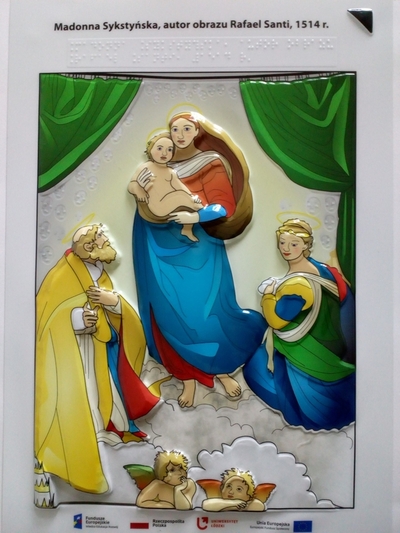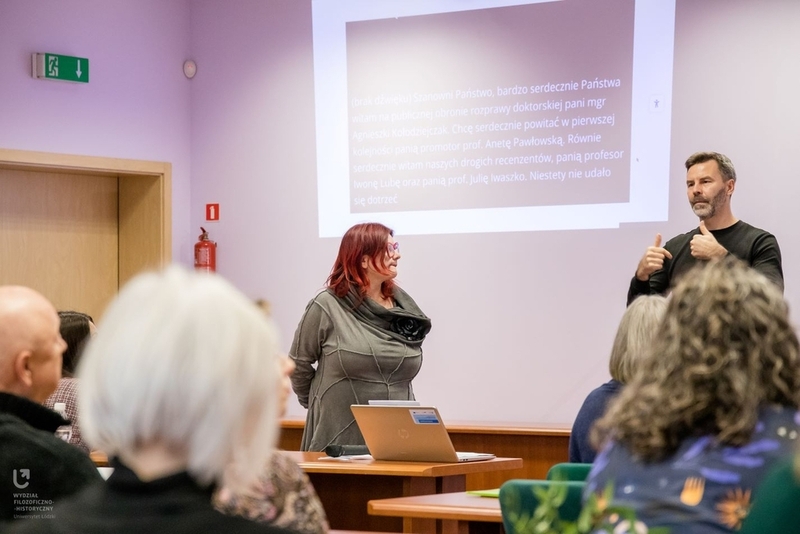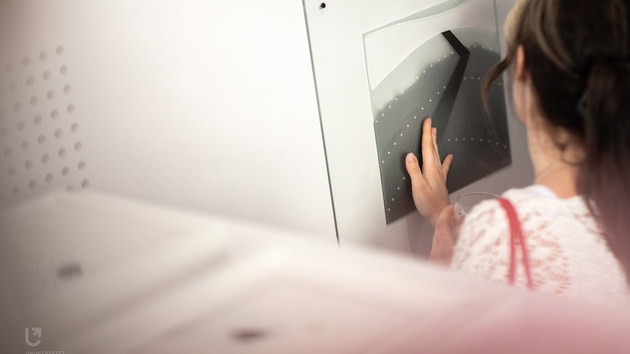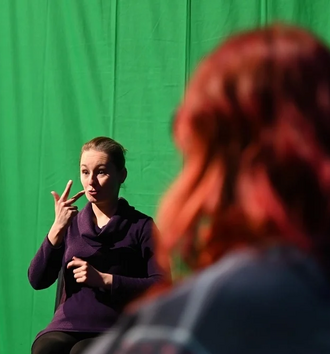Accessibility is a process
Accessibility is not only a technical or formal issue, but above all an expression of the university's social responsibility. The University of Lodz, as an educational and research institution, aims to create an environment in which everyone, regardless of their needs and limitations, can fully participate in academic life. It is a commitment to building bridges, not walls, to creating a space where everyone who studies and works here can feel accepted and supported.
Bartosz Stępień – the University of Lodz Rector’s Representative for People with Special Needs, Head of the Support and Accessibility Centre of the University of Lodz:
We strive to ensure that activities of the University of Lodz in all areas are accessible to the widest possible audience. Most of our facilities meet the requirements of architectural accessibility. We pay a lot of attention to accessibility for people with disabilities or special needs. The accessibility of our digital resources is also important. In the area of communication, we provide what the regulations require of us and what is actually needed, for example an online sign language interpreter. Accessibility is a process, something that requires constant care.
The nature and type of support depend on the individual needs and capabilities of a specific student. They concern primarily teaching activities, but also academic life in general. The University of Lodz successfully educates people with various disabilities and dysfunctions. The unit that provides support for them is the University of Lodz Support and Accessibility Centre (formerly the Academic Support Centre). It should be emphasised that we support not only those who have a disability certificate.
Bartosz Stępień notes that the needs of the academic community in terms of accessibility go beyond traditionally understood disabilities. The university faces challenges related to preparing to work with people on the autism spectrum, with Asperger syndrome, ADHD, learning disabilities and emotional, social and mental health crises. We can already see an increase in the number of students struggling with such challenges. Employees also need support.
Scientific challenges – innovative activities of art historians
Accessibility at the University of Lodz is also a topic of scientific challenges for research teams. The Institute of History of Art at the University of Lodz has been working intensively to support people with special needs in accessing art and culture since 2013. In recent years, two significant projects have been implemented:
- "Sztuka łódzka na tle sztuki europejskiej. Wykluczeni/Włączeni" [The art of Lodz against the background of European art. Excluded/Included];
- "Przyjazne miasto. Wsparcie samodzielności osób z dysfunkcją wzroku w zakresie korzystania z sieci połączeń komunikacji miejskiej w Łodzi" [Friendly city. Supporting the independence of people with visual impairments in using public transport network in Lodz] .
Both projects were co-financed by the European Union and the National Centre for Research and Development. In addition, a number of smaller initiatives have been carried out to promote equality and diversity in the arts.

Typhlographics created as part of the project “Sztuka łódzka na tle sztuki europejskiej. Wykluczeni/Włączeni" (photo: Faculty of Philosophy and History, University of Lodz)
Dr hab. Prof. Aneta Pawłowska – Head of the Institute of History of Art at the Faculty of Philosophy and History of the University of Lodz:
The question of accessibility is a question about how open we are as a society to otherness and how much we can adapt to make people with slightly different, broader needs feel comfortable in our company. On the one hand, we see that these people really need to go out to the outside world, but they are not always met with openness and favour. We should strive to make accessibility more visible but at the same time avoid imposing solutions by force. First, we should ask ourselves what the person's real needs are.
The prestigious scientific conference "Gestes et Musées" with the participation of researchers from the Institute of History of Art, University of Lodz – Prof. Aneta Pawłowska and Dr Adam Drozdowski was held in Liège, Belgium at the end of November 2024. The scientists’ presentation concerned audio description and activities for inclusiveness in culture and art. The conference was held as part of the international project UNIC 2.0 – European University of Cities in Post-Industrial Transition, which brings together universities from ten post-industrial cities, including the University of Lodz.
A team of researchers from the University of Lodz, operating under the name "Towards Accessibility", has also received a distinction in the "Popularyzator Nauki 2024" competition organised by the Science in Poland portal and published by the Polish Press Agency Foundation The awarded team includes dr hab. Aneta Pawłowska, Associate Professor at the University of Lodz – the manager, Dr Magdalena Górska, Dr Paulina Długosz, Dr Daria Rutkowska-Siuda, Dr Adam Drozdowski and Dr Agnieszka Kołodziejczak.
Audio description – you can learn it!
The actions undertaken by Prof. Pawłowska’s team are multidirectional. These are research challenges, projects about supporting disadvantaged environments, but also about teaching. University-wide classes are held here, during which knowledge on creating audio descriptions is imparted. This way, students learn how to cooperate with people with some special needs. The classes are also very popular among students of science subjects. There is no shortage of interested people, the list of course participants fills up very quickly, and the effects of the students' work are very highly rated by the academic staff.
A pioneering event – a doctoral dissertation in sign language
A breakthrough, not only for our university, but also for Poland, took place at the Faculty of Philosophy and History on 12 December 2024 – a public defense of the doctoral dissertation by Agnieszka Kołodziejczak, who is deaf, was held. The researcher set herself the goal of analysing and verifying the methods which are currently used in the practice of socio-cultural life in Poland that support the accessibility and perception of the content of culture and art She presented an innovative research approach from an "insider" perspective

Defense of a Doctoral Dissertation by Agnieszka Kołodziejczak (photo: Fcaulty of Philosophy and History, University of Lodz)
For me, as a doctoral student, the most important thing was that from the very beginning, i.e. from the admissions interview, I could count on the presence of a sign language interpreter. Later, during the pandemic, the interpreter accompanied me during online classes, annual doctoral student meetings and midterm evaluations. Moreover, my undertaking of a doctorate has resulted in changes in the Act on Industrial Doctoral Students – appropriate provisions regarding doctoral students with a disability certificate occurred. The support and ensuring full accessibility for deaf and hard of hearing people during the defence itself was also invaluable
– comments Dr Agnieszka Kołodziejczak.
The then Academic Support Centre of the University of Lodz, now the Support and Accessibility Centre, guaranteed full accessibility for all the event participants. Three Polish Sign Language (PJM) interpreters provided interpretation from Polish spoken language to Polish sign language and interpretation from Polish sign language to Polish spoken language. Additionally, we provided ‘live’ subtitles. They were a supplement to the PJM interpreters, enabling accurate monitoring of the defence and understanding of the presented content for people with hearing disabilities, those who did not know PJM or those who had difficulties understanding spoken language. There was also the possibility of using an induction loop.
Inclusiveness of science and culture – we popularise and inspire!
The University of Lodz is not only a centre of scientific research and education. We actively work to popularise science. The video materials we create have transcription, i.e. subtitles, which facilitate the accessibility of the content we present to people with special needs. We especially recommend the YouTube channel "Science Inspires". We have created a playlist of films enriched with translation into Polish Sign Language with deaf and hard of hearing people in mind.
Exhibitions to see, touch and listen to
The opening of the exhibition "Taxo. Sztuka dotyku" [Taxo. The Art of Touch], which was a part of a project carried out by two artists from Lodz – Tamara Sass and Joanna Apanowicz, was held in May 2024. The project addressed the disproportionate access to the contemporary art for visually impaired people and strove to create responsible art based on a balance between different types of sensory perception.
On the occasion of the 10th anniversary of the Memorial Prize of the First Rector of the University of Lodz Professor Tadeusz Kotarbiński for an outstanding piece of work in the field of Humanities, we prepared an exhibition that can be viewed in the old part of the University of Lodz Library until the end of March of the current year. Everyone, regardless of their mobility difficulties, will have no problem getting to the exhibition. We have prepared embossed QR codes which, when scanned, will take you to audio descriptions available on the University of Lodz website.
The Biedermann’s Palace we will host representatives of cultural institutions and decision-makers on accessibility from the Lodz voivodeship at workshops organised by the Widzimy Inaczej Foundation on 19 March of the current year. The event is a part of the project "Postępność – postęp w dostępie do kultury" ["Postępność" – progress in access to culture]. Representatives of the University of Lodz participated in the expert panel as part of this project last year.
Socially responsible
Accessibility means that the university takes actions to eliminate architectural, digital and communication barriers. It is also about ensuring that people with disabilities and special needs have equal access to educational, cultural and social resources. The University of Lodz strives to ensure that everyone can take full advantage of the opportunities the university has to offer. The social responsibility of the university is also manifested in sensitivity and empathy towards diversity. Thanks to this, the University of Lodz not only educates future specialists but also builds a society based on respect, understanding and support.
Source, edit: Agata Dawidowicz, Centre for External Relations and Social Responsibility of the University, University of Lodz
Photos: Bartosz Kałużny (Centre for External Relations and Social Responsibility of the University), Mariusz Romek (courtesy of the Lodz Voivodeship Office), resources of the Faculty of Philosophy and History, University of Lodz


